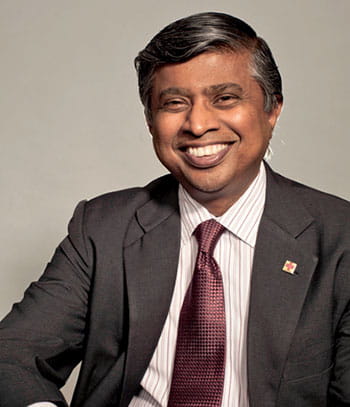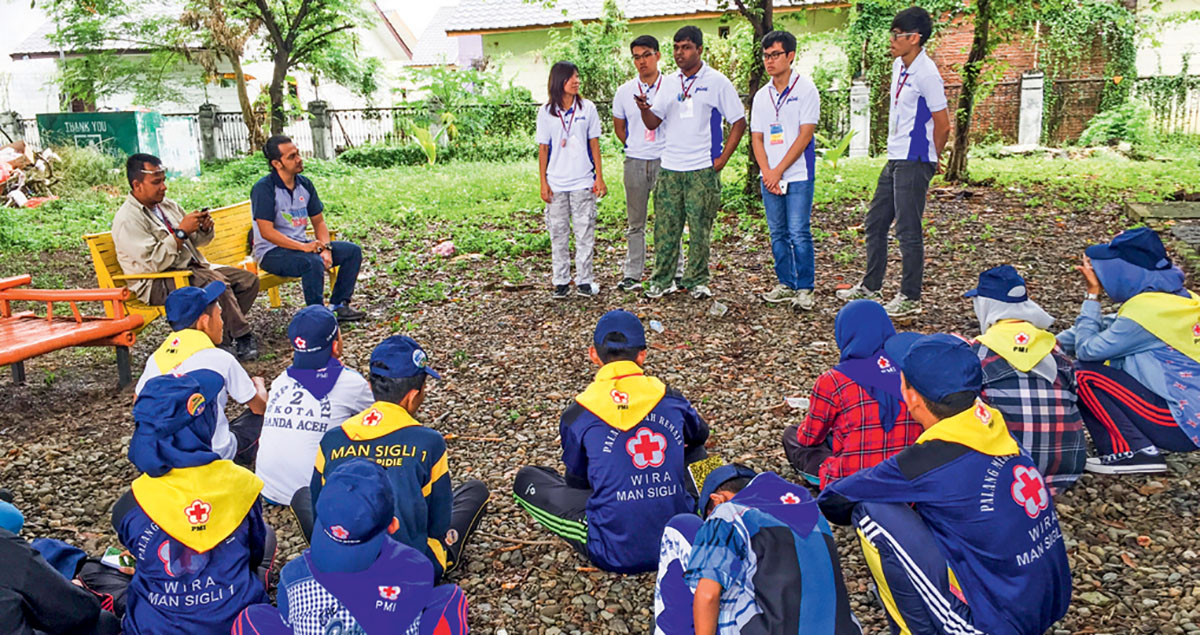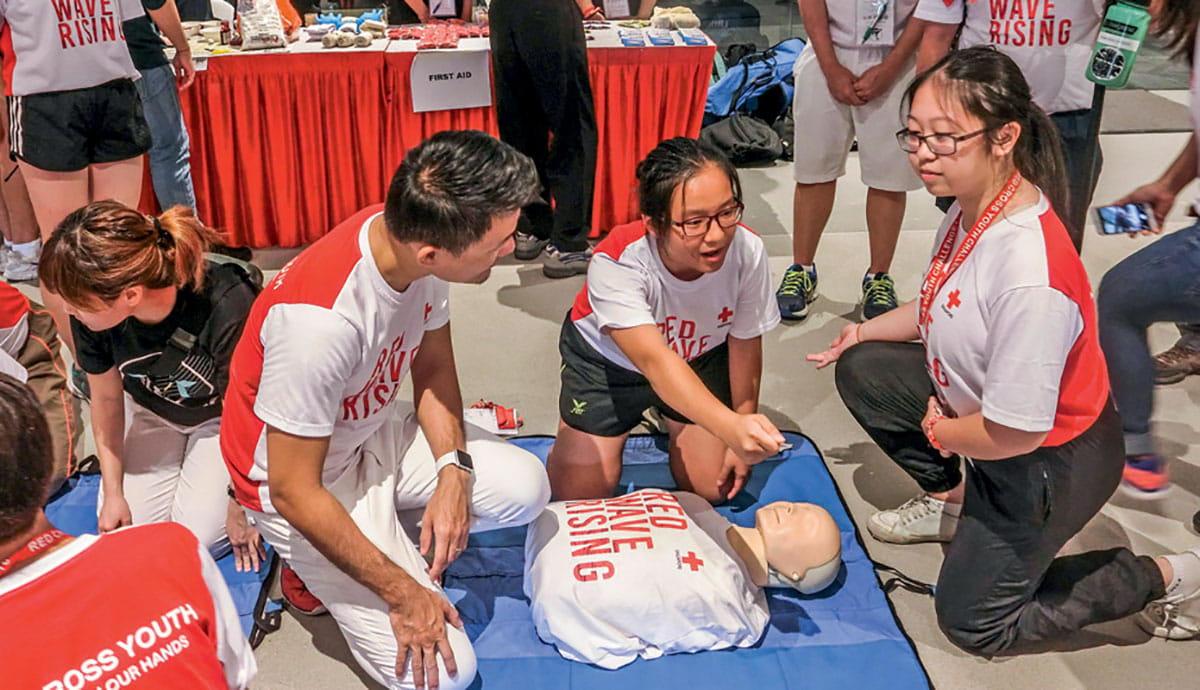Stories > Young at Heart
Young at Heart
 |
|
Benjamin William served for close to 30 years at Singaporeʼs Ministry of Foreign Affairs, where he held various positions in the Ministry and at Singapore embassies abroad, including as Singaporeʼs Ambassador to Laos from 2007 to early 2011. He left the Foreign Service to join the Singapore Red Cross in April 2011 as the director of special duties, as he wanted to help the disadvantaged in a more direct manner. He has been secretary general of the Singapore Red Cross since March 2012. |
Singapore Red Cross secretary general and CEO BENJAMIN WILLIAM shares why young people make good citizen ambassadors, how his organisation helps develop them into good global citizens, as well as the challenges of encouraging Singaporean youth to make community service a lifelong commitment.Singapore Red Cross secretary general and CEO Benjamin William on transforming Singaporean youth into global humanitarians.
PHOTOS SINGAPORE INTERNATIONAL FOUNDATION
oung people have the ability to change mindsets and break down barriers when they participate in overseas community development projects. We see this in our work at the Singapore Red Cross, when we help the more rural areas of a country.
The projects range from building a library to offering disaster relief. Because Singapore is so developed, people in the communities sometimes think we lack an understanding of the issues they face.
It is our young volunteers who correct that perspective. By the time they finish an overseas project, they would have succeeded in converting sceptics into friends. Beneficiaries often come to realise that Singaporeans are not that different from them, and a connection is formed.
Young people can be great ambassadors for the country. We find that if they have been involved in community service at home, they grow into the role of a global humanitarian more easily.
The Singapore Red Cross helps Singaporean youth to develop expertise and skills that can help influence positive change in society. We implement a comprehensive three-stage programme to achieve this. In schools, we build awareness about the work we do, such as teaching them the importance of blood donation.
The second stage is to help the youth internalise what they have learnt. We have exchange programmes with our counterparts in countries like Malaysia and Japan. This helps to build friendships across borders and provide a platform for the sharing of ideas and experiences. We also make our young people blooddonation ambassadors to educate others about the importance of giving blood.
Under the Overseas Humanitarian Programme, we send youth to do follow--up work in countries where we have already made inroads. For instance, after we rebuild a school, they will be in charge of building a library or equipping it with books. This gives them a chance to learn from the communities they are serving and gain a better understanding of challenges on the ground.
The third stage involves application. Here, they put into practice all they have learnt. For instance, they organise and collect provisions for Project RICE+, an annual community-wide initiative to distribute food items to disadvantaged families in Singapore.
“Young people have the ability to change mindsets and break down barriers when they participate in overseas community development projects... By the time they fi nish an overseas project, they would have succeeded in converting sceptics into friends. Beneficiaries often come to realise that Singaporeans are not that different from them, and a connection is formed.”
Benjamin William, secretary general and CEO of Singapore Red Cross

Youth from Singapore Red Cross taking part in a project under its Overseas Humanitarian Programme in Banda Aceh, Indonesia.

Youth undergoing a first-aid course in Singapore.
CATALYSING CHANGE
Still, challenges are inevitable. Among them are ignorance and the lack of a sense of urgency. Not many youth realise that poverty still exists in Singapore. Another challenge is that they are often pressed for time, juggling studies, and co-curricular and social activities.
In 1997, Singapore’s Ministry of Education (MOE) launched the Community Involvement Programme in primary to pre-university schools to build social cohesion and inculcate civic responsibility. Under the programme, students must complete at least six hours of community service each year.
Now, MOE emphasises the Values in Action approach, in which they support learning experiences that contribute to students’ development as socially responsible citizens.
These are good initiatives. However, many stop volunteering once they graduate from preuniversity. While it is good that they learn about giving back to society in their early school years, there is not enough emphasis on it as an activity that should be continued through life.
Community service must be given greater emphasis as part of the overall lifelong education framework. One way to solve this is to work with employers and have them make it a priority when they hire someone.
There are a few ways we can try to solve this conundrum. The first is to change mindsets – whether it is through campaigns or the education system – from thinking of community service as a good-to-have activity to a critical necessity. We can also persuade parents to lead by example and encourage their children to do volunteer work.
Secondly, it is important to recognise that young people are an important resource in society, particularly in the community service sector. We need to give them the opportunity to become leaders and forces for change in the social sector.
Once young people are involved in community service locally, they start to look beyond our borders. It is vital that they have a global mindset and maintain a connection to the real world. The benefits are manifold, not just for them personally but for the country too.
With all that we are doing, I believe we are on the right track in nurturing young Singaporeans into good global citizens. I hope that one day, Singapore’s young people can be known globally as humanitarians. It is important that we are known as a rich country, not only in terms of material assets but also in our humanitarian efforts.
